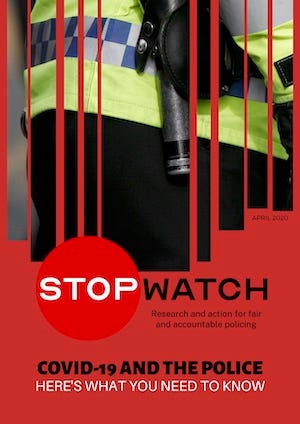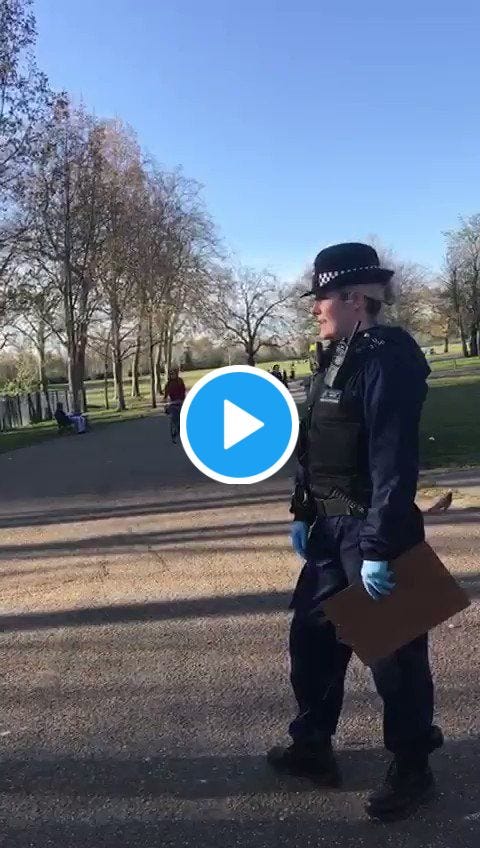April 2020: Overpolicing in a pandemic
Evidence mounts of police taking liberties with the new coronavirus law
*This is the first of a series of regular newsletter posts using a new platform, Substack. If you like this content, why not sign up?
Dear StopWatchers,
As the nation metabolises the impact of the COVID-19 pandemic into daily life, the enforcement of the new coronavirus legislation has attracted much attention, thanks to the ever increasing evidence of injustices suffered by individuals at the hands of the police. We urge those who haven’t yet already to check out the excellent ‘diary of security and surveillance’ maintained by Netpol and the Undercover Research Group, Policing the Corona State.
StopWatch are doing all that we can to keep you updated with the latest developments. Please visit our new webpage to discover all that you need to know about your rights during this public health emergency.

Please enjoy this month’s roundup of stories below.
Overpolicing in a pandemic
As the College of Policing and the National Police Chiefs Council (NPCC) issued guidance to its officers, in response to the confusion caused by the lockdown legislation (The Guardian, 01 Apr), especially with the wrongful conviction of Marie Dinou at Newcastle Central train station (The Independent, 02 Apr), solicitor Christina Ashibogu challenged whether the state ought state to run roughshod over our civil liberties in the pursuit of safety (The Justice Gap, 06 Apr).
This set the theme for the month’s activity. In parliament, MPs and peers urged police chiefs to spell out the orders given to officers tasked with overseeing the government's social distancing rules amid complaints of over-zealous enforcement (Politics Home, 07 Apr). Baroness Jones wrote of the need for the police to respect the rule law above any ad hoc instructions given by the government of the day (Left Foot Forward, 02 Apr).
Meanwhile, instances of overpolicing continued to surface on social media, including the harassment of journalist Michael Segalov while he lawfully recorded a police arrest (VICE, 16 Apr).


And despite the high-profile miscarriage of justice at Newcastle, yet more errors under the coronavirus legislation happened. A 21-year-old was wrongly convicted and fined by Met Police in Tooting under new coronavirus laws (Evening Standard, 14 Apr), but the fact that the person was charged with other offences raises fears that being charged under the wrong law is a pretext for detaining targets for other, harder-to-find-excuses-to-arrest reasons.
The police made further amendments to their guidance to accommodate for those with learning disabilities or autism after the threat of legal action (The Guardian, 14 Apr), and also relaxed rules to allow for more activities under the blanket term ‘reasonable excuse’, such as people driving to the countryside and walking ‘where more time is spent doing the latter than the former’ (The Guardian, 16 Apr).
StopWatch produced an article questioning the meaning of the term ‘reasonable excuse’ in the legislation and the guidance (StopWatch, 23 Apr).
… the document… cautions officers ‘to use “discretion and judgment” in deciding what is and is not reasonable.’ In other words, to continue doing what has already led to countless abuses of power, and surely will lead to further revisions of the guidance.
However, on the day it came out, the lockdown regulations were updated once again, this time to create a new offence of merely ‘being outside’ of your home – in addition to leaving it – without a ‘reasonable excuse’, even if you had a perfectly good reason to go out in the first place, wrote barrister Rachel Jones in her summary of the amendment (Blackstone Chambers, 23 Apr).
Aware of the likelihood that more involved policing could disproportionately affect ethnic minorities in Britain, a cross-party group of MPs warned the home secretary that police must not unfairly target ethnic minorities during lockdown (HuffPost UK, 22 Apr). Christine Jardine, the Lib Dem home affairs spokesperson, said:
This is about ensuring no community is disproportionately impacted by new policing powers, and that no one is wrongly detained, prosecuted or convicted. Transparency will be central to maintaining public trust.
Under pressure from many sides in the public eye, it has been reported that police-run social media accounts have started deleting previous messages about the enforcement of coronavirus regulations:


As the lockdown is extended for at least three more weeks beyond the original deadline, we can only hope that the government realises that effective enforcement of the lockdown still requires the public’s consent, and the police should not abuse that.
Other news
Stop and searches are still happening, and still affecting people, in one recent case resulting in the death of a mobility-assisted individual (Lancs Telegraph, 06 Apr).
Cops in schools policy in doubt, as the Metropolitan police are to review the role of officers in schools after a legal challenge raised concerns that they could have a disproportionately negative effect on pupils from black and minority ethnic groups (The Guardian, 20 Apr).
What is a knife crime these days? New police recorded crime statistics have found there were a total of 45,627 knife crime offences recorded in the 2019 calendar year, +7% on 2018, and the highest since knife crime statistics were first collected in 2010/11 (Police Professional, 23 Apr).
However, rates of increase varied across police forces. The figures – which do not include Greater Manchester Police – show a 13% increase in the West Midlands and 5% rise in London, but a 9% fall in West Yorkshire, and the number of homicides where a knife or sharp instrument was involved fell by 8%, despite a 13% increase in London.
The numbers should be approached with caution on several counts:
1) At first glance, the variation in knife crime offences is down to more arrests made for knife offences in metropolitan areas – London police recorded a third of all offences of this type – but;
2) Although robberies and violent assaults against the person dominate the proportion of knife offences recorded (88%), it’s important to remember that knife offences also include instances where no harm occurred, most notably possession, which accounted for an 11% rise in knife offences recorded. The Office for National Statistics states that:
Trends in this offence would have been influenced by increases in targeted police action, such as the recent increases in stop and searches…
3) The number of homicides involving a knife or sharp instrument is a low-volume crime. Even a 13% increase in London is set against a very low base – there were a total of 242 homicides in England and Wales of that type last year, and only 6% of the most serious offences in 2019 (see table) involved the use of a knife or sharp instrument.

4) The article omits the most interesting statistic though – how often a police search found a knife. It must be remembered that only 14%–16% of searches conducted between March 2017 and March 2019 found one.
Politicians on policing
Questions to the Mayor of London — Public Trust and Confidence in the Police (7 Apr 2020)
Peter Whittle Brexit Alliance: How does the Mayor propose to reverse the decline in public trust and confidence in the police?
Sadiq Khan Mayor of London: Trust and confidence in the police is crucial to keeping London safe. Indeed, over the last two years, confidence has declined in institutions across England and Wales.
However, 80 per cent of Londoners consistently say they trust the MPS. But, it’s concerning to see a fall the number of people who feel the police do a good a job locally. There are also gaps in levels of trust across London’s communities.
So, it is welcome that London now has the greatest number of female and BAME officers ever, thanks to targeted recruitment. I’m also proud of the work we are doing to improve transparency, like the rollout of BWV. In the 12 months to December 2019, the downward trend in public confidence has started to stabilise.
Stephen Lawrence
April 22nd saw the marking of Stephen Lawrence’s passing, which led to a watershed moment in relations between the police and ethnic minorities in Britain. StopWatch will remember him, and reiterate the resolve to eradicate such a miscarriage of justice from happening ever again.


Stay safe,
The StopWatch Team.
Donations
StopWatch is a volunteer led organisation that relies on the generosity of trusts and grant funders to operate. We DO NOT accept funding from the government or police as we believe this would compromise our ability to critically challenge.
Currently we fundraising to build the StopWatch team and ensure that the great policy and community work that we do continues. Please help spread the word. Any financial assistance you can provide is greatly appreciated and supports us to become more sustainable.
CAF Bank – Registered office: CAF Bank Ltd, 25 Kings Hill Avenue, Kings Hill, West Malling, Kent, ME19 4JQ
Account Name: StopWatch
Sort Code: 40-52-40
Account Number: 00027415
You have received this email because we have previously added you to our mailing list. You are free to unsubscribe if you no longer wish to receive our communications (link in the footer). Alternatively, if you like this newsletter and you know others who would too, why not share it?



